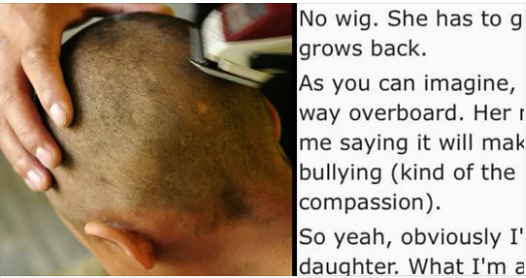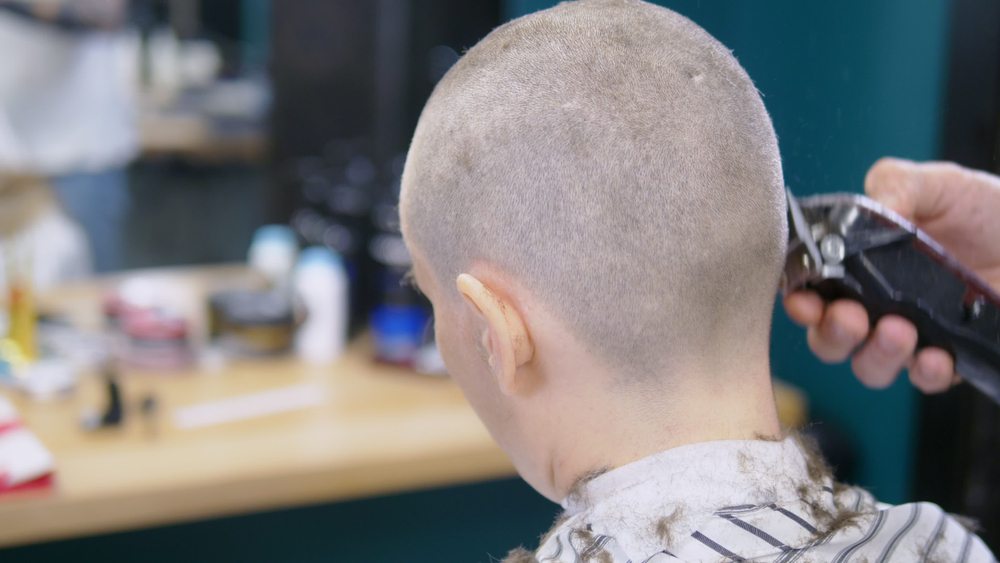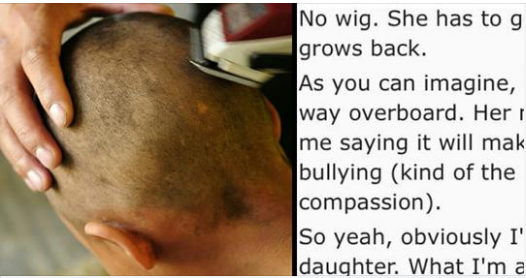Teaching Lessons Through Tough Love
As parents, we strive to nurture and guide our children, knowing deep down that they’re far from perfect. Childhood is a journey full of learning, making mistakes, and growing from those experiences. Every child will stumble at some point, but what’s crucial is how they learn from missteps and move forward.
Introducing concepts like consequences and accountability is essential in raising responsible individuals. When a child does something wrong, it’s important they face the consequences to understand the impact of their actions and hopefully not repeat the same mistakes.


Punishments can range from mild to severe, depending on the situation. It’s not uncommon to see differences in opinion regarding what constitutes an appropriate punishment, especially in complex situations.
A Controversial Punishment Decision
One father’s choice of punishment for his daughter has stirred a lot of debate. She was caught teasing a classmate who had no hair due to chemotherapy. The father decided on a punishment he felt would foster understanding and empathy – he shaved his daughter’s head.
This decision has drawn mixed reactions from the online community, yet the father remains steadfast in his belief that it was necessary. He explained his reasoning to CafeMom, expressing no regrets about his actions.
The situation was further complicated by teenage drama; the daughter was involved with the bullied girl’s former boyfriend, adding more layers to an already delicate issue.
The confrontation reportedly originated from an argument about a boyfriend, where hurtful words were exchanged, leading to the unfortunate incident.
Understanding Empathy and Compassion
What this scenario really highlights is a lesson in empathy. While the father’s method can be seen as extreme, the underlying intention was to instill a sense of compassion in his daughter, helping her to grasp the pain her actions caused someone else.
We all want our children to grow up to be kind and considerate, and sometimes, justice means showing them the impact of their actions in a tangible way. This instance opened up a conversation about the balance between discipline and cruelty.
Different cultures and families might approach situations like these differently, but the universal aim remains the same: teaching children to be better individuals. Parents must constantly weigh their decisions to find the most constructive ways to instill values without causing more harm than good.
The Importance of Communication
Open dialogue within the family about feelings, choices, and consequences can often prevent misunderstandings and foster a nurturing environment where children feel heard and valued. Conversations about sensitive subjects like bullying and understanding others’ hardships can go a long way.
The teenage years bring many challenges, and having supportive communication channels can empower children to express themselves positively without resorting to hurtful behaviors. A key part of parenting is being able to guide children through these turbulent times with a steady hand.
A Broader Lesson for All
This story serves as a powerful reminder of the influence parents have over shaping their children’s moral compass. It’s also a call to reflect on how we, as individuals, handle conflict, and how best to teach empathy to the younger generation.
Ultimately, the intention behind any punishment should be to educate and build character, not to demean or instill fear. If compassion is the end goal, then every action we take should lead us toward that outcome.
What are your thoughts on this approach to teaching empathy? Do share your opinions and comments with us. Let’s engage in a fruitful discussion!




